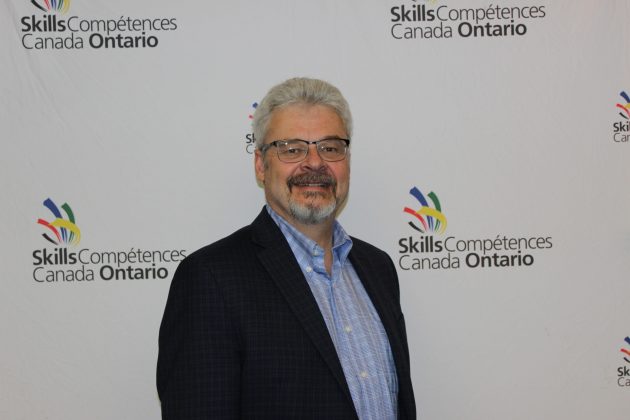
IPPT editor Don Horne spoke with Ian Howcroft, the CEO of SkillsOntario, on how the pandemic has affected skills training in the province, how the programs have adjusted to the new normal.
IPPT: Skilled trades – what is the demand for skilled workers in Ontario?
Howcroft: Data is catching up with COVID but from what we are hearing the demand is anywhere from strong to very strong for skilled workers depending on your sector. If anything, this pandemic has underscored the fact that skilled trades and tech careers are essential to keeping the machinery of our health care system, our economy and our society moving forward. Even in sectors that have been shut down during COVID, like the hotel industry, the maintenance technicians are often kept on to ensure the facilities remain functioning through this period. Meanwhile, I think many of us have a much better understanding of the critical importance of hairstylists.

Ian Howcroft
Some aspects of construction and manufacturing (for example PPE suppliers) have effectively kept running, safely, through this entire episode, while others are experiencing pent up demand. We spoke to an RV manufacturer in Hamilton recently that now has a three-year backlog of orders! So yes, we expect demand for skilled trades to only strengthen as we continue to emerge from this terrible pandemic.
IPPT: We’re losing a large number of skilled tradespeople as they enter retirement. What are we looking at?
Howcroft: While those tradespeople approaching retirement age have earned the right (and the finances) to retire, doing so presents a serious challenge for the economy. According to the Bureau of Labour Statistics for example, the average age of a Welder in Ontario is 60 years old. That means a huge proportion are already eligible or will be eligible to retire in the near future. This will need a multi-faceted approach to address the magnitude of the challenge. However, our first priority is to make young people aware of and connect them with the tremendous opportunities that exist in the skilled trades and technologies.
Also starting at an earlier age, we want to engage kids with fun activities that highlight the basic competencies that would enable them to pursue skilled trades and tech down the road and benefit them in any future work (problem solving, design thinking, teamwork, hands-on activities, etc.). We also need to better connect with parents and other career influencers to dispel myths associated with the trades.
IPPT: How can companies encourage young people to enter skilled trade training?
Howcroft: There are so many ways that companies can help to encourage young people to enter skilled trades training. Everything from providing mentors for our Young Women’s and other conferences, participating in our Career Showcase, providing volunteers and speakers, etc. Also providing experiential work/learning opportunities for young people is critical through organizations like OYAP or the colleges.
Many employers have resisted this because it can be time consuming and there is a fear of poaching. But if we don’t increase the overall number of people entering the trades through these opportunities, the problems will only worsen. The other thing this pandemic has driven home dramatically is that we enjoy in this country the freedom to choose to think only for ourselves and to do nothing. But if we care about each other and think about the bigger picture, we can achieve great success for ourselves and for those around us. Canada, in contrast to the United States, has demonstrated how working collaboratively and cooperatively can drive success against a deadly pandemic. My hope would be that we can achieve the same on the skills front in the coming decade.
IPPT: What benefits can companies realize by participating in Skills Ontario programs?
Howcroft: In the near term, companies can benefit from increased brand recognition amongst the current and future labour force and current and future customers. Our premium partners like Magna, Linamar and UA Canada have event provided job offers to competitors and benefited from direct hiring. Many companies also value the volunteer opportunities for their own employees to give back to their community by providing mentors, speaking opportunities and involvement in our technical communities. There is a real sense of pride that comes from this engagement and Skills Ontario offers awards and recognition for outstanding volunteer contributions.
IPPT: Young women and First Nations youth – what programs are available to nurture their skillsets?
Howcroft: We have programs for both Young Women’s and First Nations, Metis and Inuit that are designed to offer them relevant information about the Skilled Trades and Technologies as well as mentorship opportunities and fun, interactive activities. In normal times, and we hope to return to that soon, we offer hands on activities that give participants the chance to try a trade. You can check out our website under the programs tab at SkillsOntario.com for all the details of our virtual programs that are available.
IPPT: How have the many programs you offer been affected, or have been adjusted, due to COVID?
Howcroft: Because of the hands-on nature of our normal activities, all of our programming has been affected to some extent. However, I’m very proud of the way our team as adapted to provide all of our programming virtually (young women’s, virtual Skills Competition, virtual classroom presentations, etc.) while creating new engagement opportunities like our Skills Podcast and #SkillsAtHome Challenge series to engage people in different ways regarding the incredible opportunities available to them through the Skilled Trades.
While we hope to get back to in-person engagement, we expect given the success we have had, we will continue many of these activities, at least as an option to reach more people.
Print this page